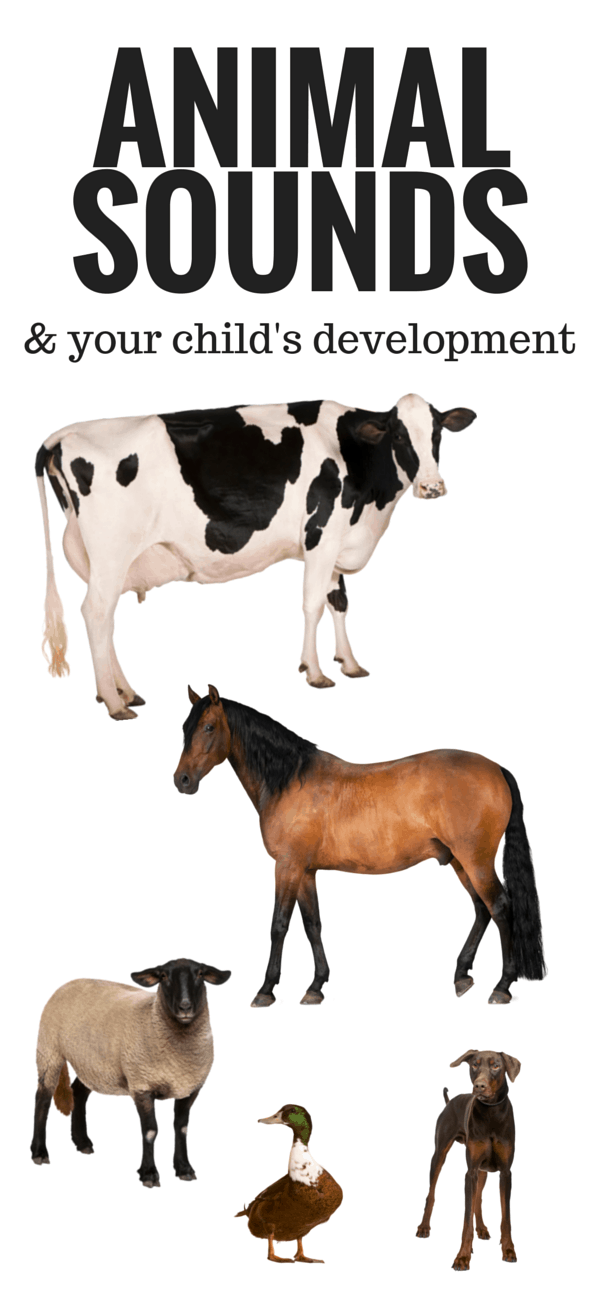Animal Sounds For Toddlers

Disclaimer: I am not a speech pathologist. This post is written solely on the observation of language development with my three children as well as some developmental background in my early childhood education courses.
Animal Sounds For Toddlers
I am convinced that animal sounds represent a pretty monumental milestone when it comes to a child’s language development. Something so simple yet so profound. The language development of all three of our children really took off after they were able to associate animals with their sounds and verbally attempt to mimic those sounds.
Once children can start saying their animal sounds, it seems to their vocabulary expands tenfold shortly after. I know it sounds weird and a little crazy, but here are my observations…
1. Learning farm animal sounds is fun.
Who doesn’t love reading farm animal books to their child? Babies even love animal sounds and we love making our babies smile by making funny animal noises. It is a win-win for everyone. :)
2. Learning animal sounds is a precursor to reading
I know, it sounds like it might be a little bit of a stretch. But in essence, your child is learning to associate the picture of a cow (symbol) with “moo” (the sound that it makes)… which is exactly what they will be doing in about 4-5 years when they learn to associate letters (symbols) with their sounds, aka learn to read.
3. Learning animal sounds is great for cognitive development
Not only are the sounds important for toddlers to replicate (since many of these sounds are in common words we say), but I think there is a cognitive development component as well to communicating when asked, “What does the sheep say?” Your little one must listen, comprehend that you are asking a question, and respond with the correct animal sound. That’s a lot of processing!








I only have one child so I can't say that there was a for sure correlation, but my son is super verbal–hes nearly 15 mos. and says around 100 words at least (he knows many that I don't know he knows)… Anyway, he started mostly with animal sounds I think. They were partly what he was most interested in, I think and we just constantly read to him and showed him pictures of animals and he picked them up really quickly. So I definitely agree its a good place to start! also, sometimes I think the animal sound is easier to say than the name of the animal.
I have noticed the same. My son's speech therapist agreed. We worked hard on animal sounds until my son was finally speaking. Once they have the sounds down and the mouth shapes needed to make the sounds they take off with the speech.
Absolutely! Sophia is very in to animal sounds and what each animal is called. She is now picking up letters and numbers and actually getting them right! Their little minds grow so quickly, it's amazing what they can do! We did take your advice on picture books and she is obsessed with them (and Fancy Nancy, of course). LUL and Happy Thanksgiving! Thanks! Tiff
My daughter is 21 mo. She had never really been a talker, I sort of felt like she was behind verbally. Then this summer my husband (an elem. ed teacher) worked with her on all her animal sounds and noises and since then I have noticed her language really take off. I never put the two things together until you wrote this post. So I too agree animal noises must really help!
Question: My daughter (now 3) is very verbal, and (according to the dr.) has always been ahead of the curve on her speaking skills. I honestly never really thought a lot about it.
Until my son (now 20 months old) had his 18 month appointment. He's about where he needs to be, but I feel as if he's behind when compared to Sissy (which I know you can't do, but still).
Here's the thing though – we do all the animal sounds. And to every single animal, he roars. And then laughs. Or, if he doesn't answer right away, Big Sister answers for him, she also translates a lot for him.
Is this a normal thing? Should I be concerned? He can point out duck, cat, dog with clear words, and can find other animals when asked (sheep, cow, etc, he just doesn't say names yet). He can correctly identify between a car and a truck, and in general conversation gets his point across, but the sounds just aren't coming. Maybe he's just being silly?
I wouldn't worry about it Curly-T, kids are just different. My 3 year old is very, very thoughtful, inquisitive and extremely talkative. She was talking in short sentences and making all the animal sounds at one year. My 14 month old daughter talks when she feels like it, and some days hardly talks at all, but she's always pulling little pranks and then laughing at us. She's clearly very intelligent, but when I try to get her to say animal sounds she laughs and laughs or says "QUACK!" loudly. But if she sees a live cow, dog, cat or whatever she'll make it's sounds. Kids are all just different. As long as you're talking and interacting lovingly with them, they'll grow up well!
My daughter definitely learned animal noises before any other language (this may have something to do with my slight obsession with animals). She imitated our cat almost perfectly early on, said woof for dog, baaaa for sheep, etc. She still only says noises and not their names…but, I love it. She now has many words and is doing great with language. I had not thought about the cognitive requirements of identifying the animals and then making the noises. Great post!
I know that I'm coming back to this post quite late to comment BUT my daughter is actually receiving therapy services for a slight developmental delay mainly in the speech area. They are BIG on animal sounds and imitation …so from the professionals they agree!! nice job!!
Animal noises play a big part in a child’s language development. This is one of the goals we (speech therapists) look for between the ages of 12-15 months (3 animal noises) and then again at 15-18 months (I think 5).
New to your blog and LOVE it! Such great things to do with kiddos! :]
We’ve been trying to teach our son both Spanish and English simultaneously, and I was concerned that he might be slower with language skills because of the two languages being spoken to him all the time. However, with animal sounds, he took off! We can ask him in English or Spanish what certain animals say and he responds accordingly. It’s been so exciting!
@Emily – My daughter is also learning both languages and I to was a bit concerned but I feel that she is excelling in other areas and it’s just different for all children. I am going to take this idea and apply it to my daughter. I haven’t put the focus on animals but I know she’s knows them and some sounds, so I will start to work on them with her. :) (She’s 18 months)
Hi, I totally agree that there is a correlation! My son started out with most of the common animal sounds a little after he turned 1. And for a 22 month old, he is very chatty and speaking many sentences already!
Hi, My daughter is 6 months old and she is my first child. I am not sure what activities I should start with her at this age so that her verbal skills can be improved. Also her ability to recognize things should also be improved.
Could you suggest some activities or books if that helps.
Thanks
I am a stay at home mom with 13.5 year old twins. We do A LOT of animal names, sounds and I also teach them sign language. One daughter’s first word/sign combo was “dog” at about 11months. So many other word/sign combos soon followed. My other daughter used to say dog (and sign) about the same timeframe as my other daughter and also say duck (she did not sign duck) when my other daughter did, but now only signs “dog” when she sees or hears our dogs. That was her only word up until last week or so and then they both added “no”. She is the more observant child and isn’t as eager to please when it comes to communicating. When she does do a sign though, it is of perfect form. My more verbal daughter tries saying almost every other word and picks up about 1 to 2 signs a day whereas my other daughter does maybe one sign a week. Our doctor feels they are both more advanced than most their age, so I must be doing something right!? Thank for all the suggestions on this site. We have been doing most of them, but I’m always looking for new ideas/projects.
My daughters first words were ma, da, ball, go, bubble, bye, hi, up, open, and then moo, oink, tweet, meow, arf, roar, buzz, neigh, baa, night night, jump, and elmo. Her comprehension is astounding and she can sign please, thank you, more, go, and open. Since her mastery of animal sounds, only a few weeks ago, she hasnt acquired many more words, but comprehension has increased.
How funny! I was talking with my husband about this a few days ago. I think that you are right now. Learning animal sounds also helps children learn to form certain sounds with their lips, tongue, and teeth–skills that aid them in their speech development.
I agree! I teach music, and we do a lot of activities with animal sounds in the kindergarten classes. After watching my son’s language develop, I thought it would be a fun thing to do with the kinders. As a bonus, they absolutely love to say animal sounds!
Thank you for this information. My daughter is almost 19 months old and loves dogs but will not say any animal sounds. I tell her the sounds a lot but she is not responding to them. I work full time – any suggestions as to how I should teach her?